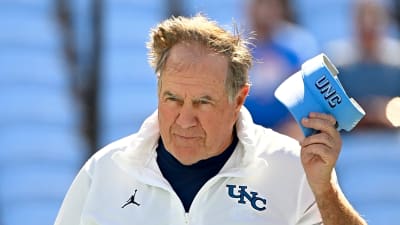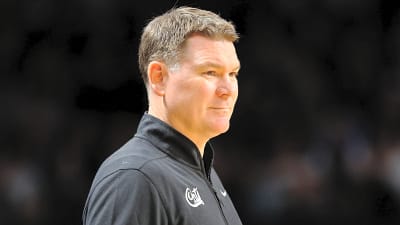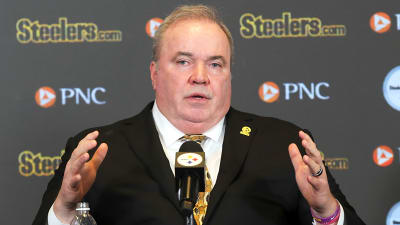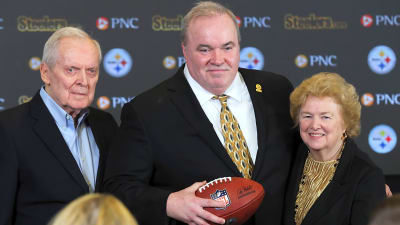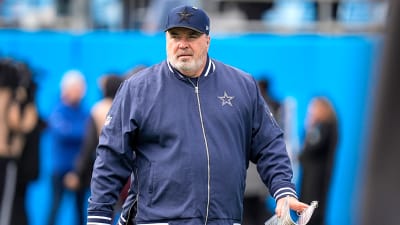- Home
- Quizzes
- My Quiz Activity
- Newsletters
- MY FAVORITES
- Add Sports/Teams
- SPORTS
-
NFL
- NFL Home
- Arizona Cardinals
- Atlanta Falcons
- Baltimore Ravens
- Buffalo Bills
- Carolina Panthers
- Chicago Bears
- Cincinnati Bengals
- Cleveland Browns
- Dallas Cowboys
- Denver Broncos
- Detroit Lions
- Green Bay Packers
- Houston Texans
- Indianapolis Colts
- Jacksonville Jaguars
- Kansas City Chiefs
- Las Vegas Raiders
- Los Angeles Chargers
- Los Angeles Rams
- Miami Dolphins
- Minnesota Vikings
- New England Patriots
- New Orleans Saints
- New York Jets
- New York Giants
- Philadelphia Eagles
- Pittsburgh Steelers
- San Francisco 49ers
- Seattle Seahawks
- Tampa Bay Buccaneers
- Tennessee Titans
- Washington Commanders
-
MLB
- MLB Home
- Athletics
- Arizona Diamondbacks
- Atlanta Braves
- Baltimore Orioles
- Boston Red Sox
- Chicago White Sox
- Chicago Cubs
- Cincinnati Reds
- Cleveland Guardians
- Colorado Rockies
- Detroit Tigers
- Houston Astros
- Kansas City Royals
- Los Angeles Angels
- Los Angeles Dodgers
- Miami Marlins
- Milwaukee Brewers
- Minnesota Twins
- New York Yankees
- New York Mets
- Philadelphia Phillies
- Pittsburgh Pirates
- San Diego Padres
- San Francisco Giants
- Seattle Mariners
- St. Louis Cardinals
- Tampa Bay Rays
- Texas Rangers
- Toronto Blue Jays
- Washington Nationals
-
NBA
- NBA Home
- Atlanta Hawks
- Boston Celtics
- Brooklyn Nets
- Charlotte Hornets
- Chicago Bulls
- Cleveland Cavaliers
- Dallas Mavericks
- Denver Nuggets
- Detroit Pistons
- Golden State Warriors
- Houston Rockets
- Indiana Pacers
- Los Angeles Clippers
- Los Angeles Lakers
- Memphis Grizzlies
- Miami Heat
- Milwaukee Bucks
- Minnesota Timberwolves
- New Orleans Pelicans
- New York Knicks
- Oklahoma City Thunder
- Orlando Magic
- Philadelphia 76ers
- Phoenix Suns
- Portland Trail Blazers
- Sacramento Kings
- San Antonio Spurs
- Toronto Raptors
- Utah Jazz
- Washington Wizards
-
NHL
- NHL Home
- Anaheim Ducks
- Boston Bruins
- Buffalo Sabres
- Calgary Flames
- Carolina Hurricanes
- Chicago Blackhawks
- Colorado Avalanche
- Columbus Blue Jackets
- Dallas Stars
- Detroit Red Wings
- Edmonton Oilers
- Florida Panthers
- Los Angeles Kings
- Minnesota Wild
- Montreal Canadiens
- Nashville Predators
- New Jersey Devils
- New York Islanders
- New York Rangers
- Ottawa Senators
- Philadelphia Flyers
- Pittsburgh Penguins
- San Jose Sharks
- Seattle Kraken
- St. Louis Blues
- Tampa Bay Lightning
- Toronto Maple Leafs
- Utah Mammoth
- Vancouver Canucks
- Vegas Golden Knights
- Washington Capitals
- Winnipeg Jets
- NCAAF
- NCAAM
- Olympics
- Boxing
- Entertainment
- Lifestyle
- Golf
- MMA
- Soccer
- Tennis
- Wrestling
- Sports Betting
- More Sports
- RESOURCES
- My Account
- YB on Facebook
- YB on Twitter
- YB on Flipboard
- Contact Us
- Privacy Policy
- Terms of Service
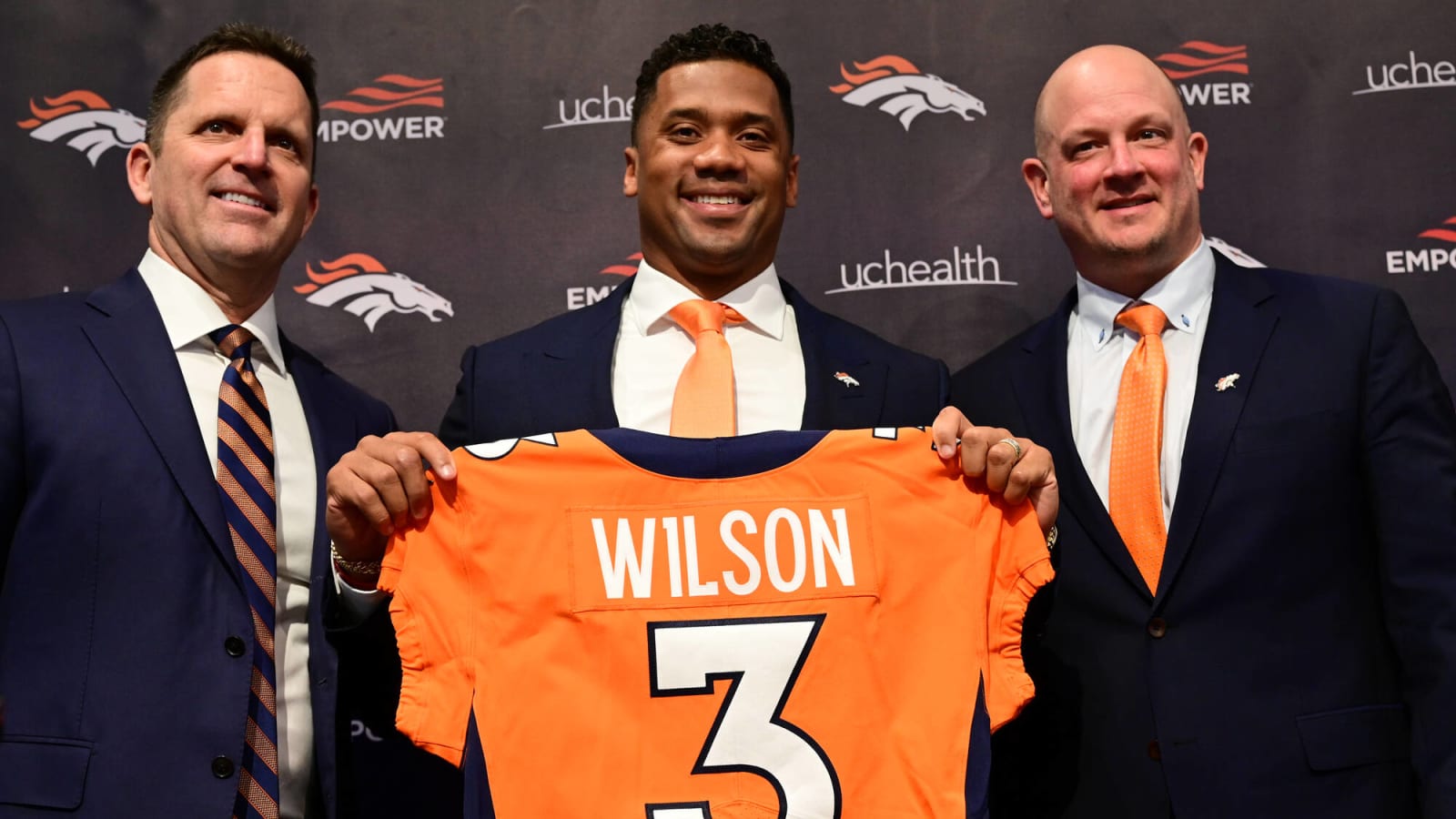
How quarterback instability has defined certain NFL teams
The Broncos, Colts, and Commanders are preparing to start their sixth Week 1 quarterback, respectively, in the past six seasons. That puts these franchises on rare terrain for QB turnover, but other teams have gone through similar stretches of passer instability. Here are the teams to enter at least four straight seasons with a different starting quarterback since the 1970 AFL-NFL merger.
How quarterback instability has defined certain NFL teams

The Colts and Commanders are preparing to start their seventh Week 1 quarterback, respectively, in the past seven seasons. That puts these franchises on rare terrain for QB turnover, but other teams have gone through similar stretches of passer instability. Here are the teams to enter at least four straight seasons with a different starting quarterback since the 1970 AFL-NFL merger.
San Francisco 49ers, 1973-76

The top 49ers quarterback for over a decade, John Brodie won MVP acclaim in 1970 and took the team to three straight playoffs during his late 30s. Brodie wrapped his career after the 1973 season, leading to a 49ers decline. Longtime backup Steve Spurrier's shoulder injury prevented him from taking over in 1974; Joe Reed started that season. While Spurrier returned, the 49ers made two trades to keep the ex-Heisman winner benched. San Francisco acquired 35-year-old journeyman Norm Snead at the 1974 trade deadline and set a precedent only the 2022 Browns have followed by trading three first-rounders for a QB (Jim Plunkett) in 1976.
Houston Oilers, 1981-84

Houston's effort to spark its offense with a Dan Pastorini-for-Ken Stabler trade led to the future Hall of Famer opening the 1980 and '81 seasons as the Oilers' starter. The Oilers cut Stabler in 1982 and used backup Gifford Nielsen to open that year. They moved to Archie Manning, the longtime Saints starter whom Stabler supplanted in New Orleans, in '83. To stop this shuffle, the Oilers gave CFL star-turned-free agent Warren Moon the highest salary in NFL history, guaranteeing him a $1 million-per-year contract. The Canton-bound gunslinger became a 10-year starter in Houston, making six Pro Bowls during that span.
Cleveland Browns, 1983-86

The USFL's New Jersey Generals outbidding the Browns for Brian Sipe ended Cleveland's run of stability (eight Sipe starter seasons) at quarterback. The former MVP lasted just one year in the upstart league, but the Browns slogged through a 1984 season with ex-Sipe backup Paul McDonald starting 16 games. An era-defining break altered the Browns' course in 1985. Youngstown native-turned-Miami Hurricane star Bernie Kosar maneuvered his way to Cleveland via the supplemental draft. Veteran Gary Danielson provided the 1985 bridge to Kosar, whose first two full QB1 seasons led to Browns AFC championship game berths. Kosar was the Browns' starter until 1993.
Los Angeles Rams 1984-87

The Rams have cycled through QBs for generations, but the franchise made various plans work for a while. Super Bowl XIV starter Vince Ferragamo's last run as the team's starter occurred in 1984 before the Rams traded for Jeff Kemp. In 1985, Los Angeles went with 34-year-old rookie Dieter Brock, a CFL MVP who gave the NFL a try after 10 years up north. He and Eric Dickerson piloted the Rams to the NFC title game -- a Bears mauling -- but a 1986 preseason injury ended Brock's career. This led the Rams to pry holdout rookie Jim Everett from the Oilers. After Steve Bartkowski began the '86 season as L.A.'s starter, Everett took the reins and kept them through 1993.
San Diego Chargers, 1987-93
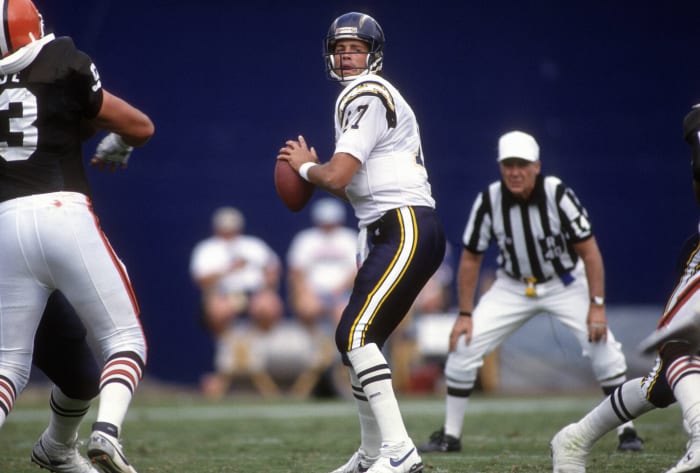
Like the Broncos a generation later, the Chargers lacked a successor for a retiring Hall of Famer. Dan Fouts' 1988 exit led to Babe Laufenberg taking over. That did not last, and the Bolts dealt a second-round pick for Jim McMahon in 1989. San Diego did not re-up the Chicago icon, going with Mark Vlasic and sixth-round pick John Friesz in 1990 and '91, respectively. Billy Joe Tolliver mixed in here as well but was never a Week 1 Bolts starter. The carousel stopped in 1992 when ex-Washington GM Bobby Beathard traded for one of his old draft picks (Stan Humphries). After one Bob Gagliano start in 1992, Humphries kept the job for six years, starting Super Bowl XXIX during that time.
Phoenix Cardinals, 1988-91

1988 featured several quarterback injuries. The Cardinals were dealt the worst blow, with longtime starter Neil Lomax -- a two-time Pro Bowler -- suffering a career-ending hip malady. It took a while for the relocated team to stabilize this position. The Cards signed veteran Gary Hogeboom as a Plan B free agent in 1989, but the ex-Cowboys and Colts passer lasted one year. Timm Rosenbach, a first-round supplemental draftee, took over in 1990. A Rosenbach ACL injury caused him to miss all of 1991, leading to Tom Tupa -- later an acclaimed punter -- starting 11 games that season. Tupa outlasted all his Phoenix teammates, playing until 2004.
Minnesota Vikings, 1991-94
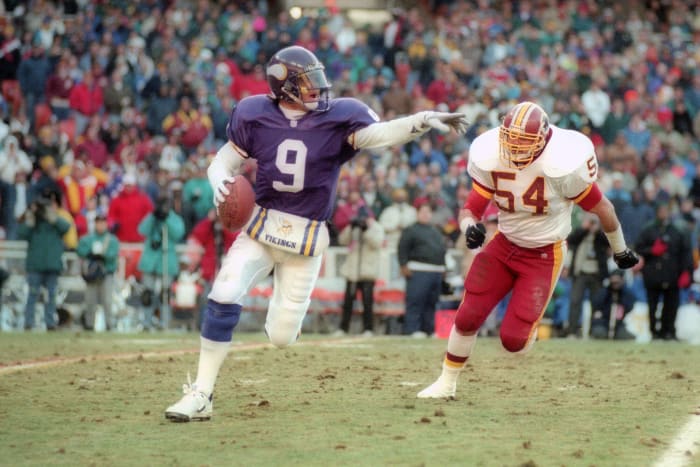
Fran Tarkenton and Tommy Kramer had given the Vikings stability for 15 years, and Wade Wilson piloted the team to three playoff berths from 1987-89. Wilson wrapped his Minnesota career in 1991. Primarily a backup during Wilson's run, Rich Gannon entered the fray as the Vikings' primary 1992 starter. First-year HC Dennis Green benched the future MVP for Sean Salisbury down the stretch of an NFC Central-winning season, and Minnesota signed Jim McMahon in 1993. Amid a journeyman period, the ex-Bears icon avoided major injuries and piloted the Vikes to the '93 playoffs. The team's 1994 Warren Moon trade eventually calmed the waters. Moon started three seasons in Minneapolis.
Arizona Cardinals, 1994-98

Steve Beuerlein held down the Cardinals' fort for a bit, opening the 1993 and '94 seasons in the lineup. Arizona exposed Beuerlein in the 1995 expansion draft, and Jacksonville took him first overall. More instability followed for the then-NFC East team. Ex-Pro Bowlers Dave Krieg and Boomer Esiason passed through as free agents in 1996 and '97, respectively. Both were one-and-dones, though Esiason's 522-yard passing game in Washington still ranks in the top five all-time. Ex-Giant Kent Graham provided the 1997 bridge to Jake Plummer, who is the Cards' only primary QB starter who lasted more than five seasons since Neil Lomax.
Philadelphia Eagles, 1995-2000
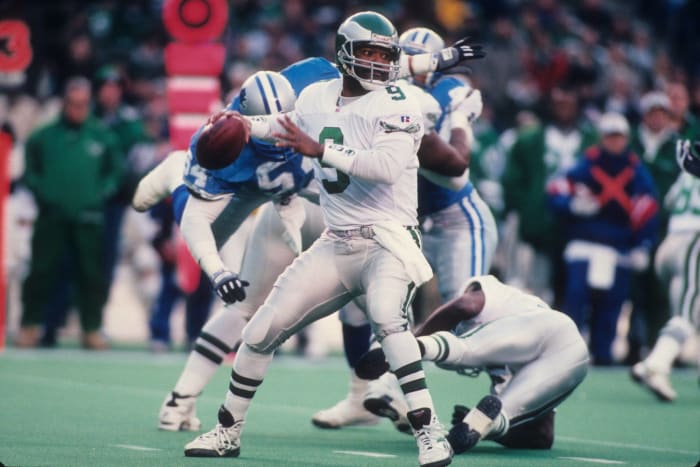
Ray Rhodes benching Randall Cunningham in September 1995 ended the Eagles' most glamorous QB era, and it started a carousel. Although Rodney Peete led Philly to a playoff blowout that season, a 1996 injury ended his run as the team's primary starter. Over the next two years, Rhodes went with ex-Heisman winner Ty Detmer and third-round pick Bobby Hoying in Week 1. Andy Reid's Pennsylvania arrival meant a big QB swing. Future Super Bowl-winning Eagles coach Doug Pederson began the 1999 season at the helm, doing so as Donovan McNabb's gatekeeper. The highly drafted dual threat's 11-year QB1 run is the longest in Eagles history.
Buffalo Bills, 1996-99
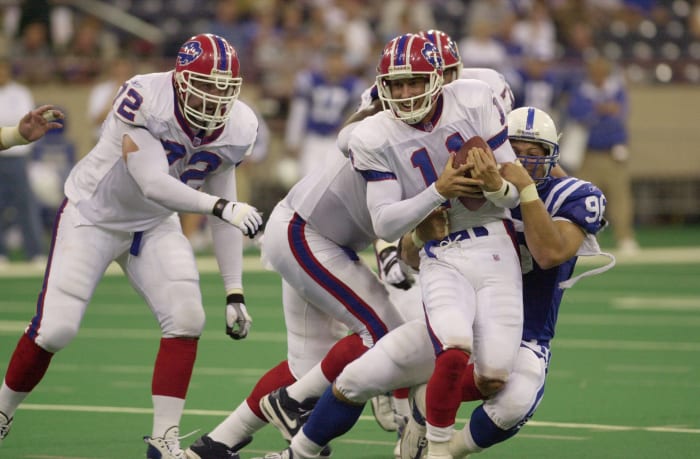
While 1983 draft classmates John Elway and Dan Marino respectively played 16 and 17 NFL seasons, Jim Kelly was done after 11. The ex-USFL star retired after a 1996 wild-card loss, bumping up Todd Collins. The former second-round pick played 16 seasons, mostly as a backup, after sputtering as a starter in Marv Levy's 1997 finale. The Bills then traded a first-round pick for Jaguars backup Rob Johnson in 1998, the same offseason in which they greenlit Doug Flutie's NFL comeback. This ignited a years-long battle, peaking with Johnson's bizarre promotion for the "Music City Miracle" loss. After Flutie led the team to the 1999 playoffs, Johnson reclaimed the job entering 2000.
Baltimore Ravens, 2000-03

The Ravens moving on from Vinny Testaverde after five seasons produced a few changes. Ex-Rams starter Tony Banks kept the Ravens' job for 1 1/2 seasons, and while this period is best known (offensively) for Trent Dilfer's game-managerial mastery in 2000, Dilfer was never Baltimore's Week 1 starter. The Ravens signed Elvis Grbac, their Brad Johnson free agency consolation prize, in 2001. Grbac retired after helping the team to the '01 playoffs, saddling a generational Baltimore defense with backup Chris Redman to start the 2002 season and first-round bust Kyle Boller in 2003. This job was unsettled until Joe Flacco's 2008 arrival.
Arizona Cardinals, 2002-05

Back to the Cardinals, whose post-Jake Plummer years featured a few signal-callers and sub-.500 seasons. Plummer finished his six-year Arizona run in 2002, signing a $40 million deal with Denver in 2003. The Cards replaced him with Jeff Blake, the former long-term Bengals starter who had settled into a journeyman phase. Blake was gone by 2004, and Josh McCown -- who later took the journeyman label to a special place -- took over in 2004 (after his Week 17 heave to Nate Poole altered the '03 NFC playoff bracket). Kurt Warner stopped these changeovers by signing in 2005, but the Cardinals nearly botched his rebound by drafting Matt Leinart the next year.
Chicago Bears, 2000-05
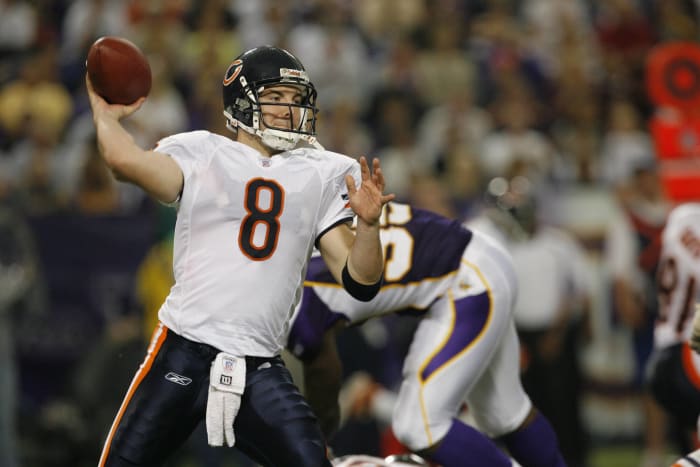
Between Jim McMahon and Jay Cutler, the Bears went through a line of passers. Although they drafted Cade McNown in the 1999 first round, Shane Matthews was a more frequent presence post-Erik Kramer. McNown opened the 2000 season as Chicago's starter, but Matthews was back in command by 2001. That year, however, veteran Jim Miller (feat. a forgotten elite defense) piloted a 13-3 season. A shoulder injury sustained in the playoffs led to Miller's career ending. Chicago began its next era in 2003 by drafting Rex Grossman in Round 1, but Kordell Stewart began that season as Chicago's starter. A Grossman 2005 injury introduced rookie Kyle Orton to the NFL world.
Cleveland Browns, 2003-06

Tim Couch's broken leg brought in Kelly Holcomb for the Browns' only playoff game from 1999-2020, and Couch's backup kept the job to start the 2003 season. After Holcomb and Couch each started eight games that year, the Browns pivoted to veterans. They signed Jeff Garcia to a four-year, $25 million deal in 2004; that turned into a one-year partnership. After Garcia's quick exit, Cleveland went with 12th-year vet Trent Dilfer in '05 -- via trade with the Seahawks. Dilfer started 11 games for Romeo Crennel's first Browns team. The other starter that year, Charlie Frye, returned in 2006.
Tampa Bay Buccaneers, 2004-07
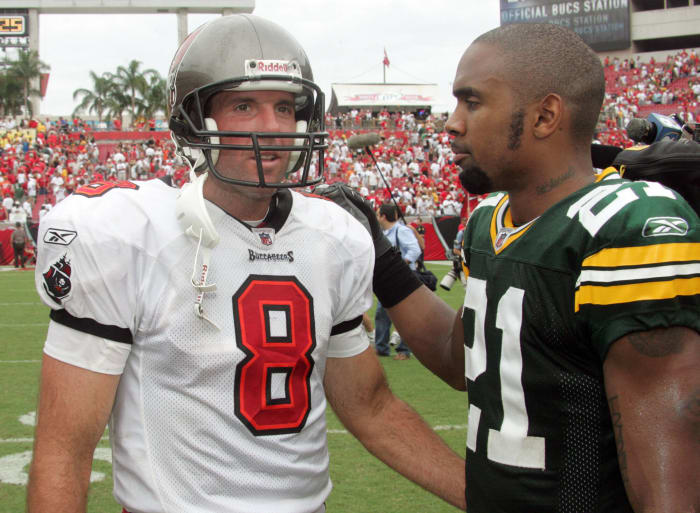
As their Super Bowl XXXVII nucleus splintered via John Lynch and Warren Sapp exits and the Keyshawn Johnson banishing, the Bucs still had Brad Johnson starting to open 2004. The Super Bowl-winning QB was gone by 2005, giving way to ex-Broncos starter Brian Griese. Tampa Bay began the 2006 season with another future broadcaster, Chris Simms, who had led the '05 team to the playoffs. A scary spleen injury in Week 3 of the '06 season stopped Simms' Bucs run. A 2007 trade for Jake Plummer did not take, with Plummer instead retiring, and led Jon Gruden to Garcia. The Gruden-Garcia setup lasted two seasons and included a 2007 NFC South title.
Miami Dolphins, 2004-08
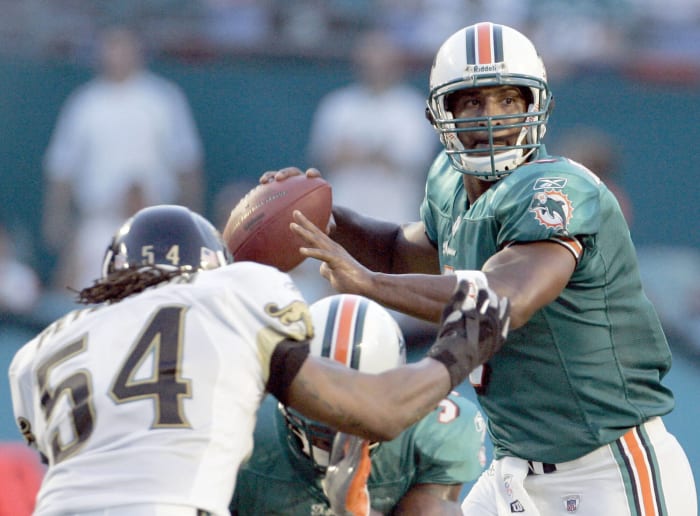
The Dolphins passed on Drew Brees, amid shoulder rehab in 2006, and went through several passers in the 2000s. Dan Marino successor Jay Fiedler's Dolphin career wrapped in 2004, and replacement A.J. Feeley became a Miami one-and-done. After allowing Brees to land in New Orleans, the Dolphins traded for Daunte Culpepper, who was coming off ACL, MCL, and PCL tears. Culpepper lasted four games. The bottom fell out in 2007, with Trent Green's second concussion in two seasons keying a 1-15 slate. Fortunately, the Jets' Brett Favre trade allowed a reprieve in the form of Chad Pennington, who directed Miami to the 2008 AFC East crown. An injury halted Pennington's rebound by 2009.
Oakland Raiders, 2004-08
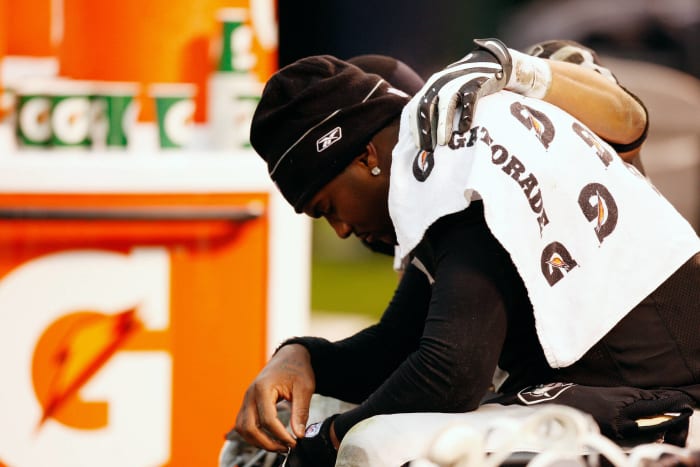
This stretch includes the final three games of Rich Gannon's career -- the first three of the 2004 season. Following the former MVP's second injury absence in two seasons, a Raiders descent was unavoidable. Fresh off the Giants' Eli Manning addition, Manning's predecessor Kerry Collins replaced Gannon. But the Raiders did not re-sign Collins in 2006. Ex-Saint Aaron Brooks came in, and while many factors contributed to a 2-14 season, Brooks went 0-8 as a starter that year. That season gave Oakland JaMarcus Russell draft real estate. Before Russell's ignominious run, Josh McCown started the 2007 season's first nine games.
Kansas City Chiefs, 2006-09

Although Larry Johnson delivered his second and final strong season in 2006, a Chiefs decline loomed. A vicious hit in Week 1 concussed Trent Green, halting his six-season Kansas City stay and forcing in Damon Huard. The Chiefs made the 2006 playoffs at 9-7 but traded Green to the Dolphins in 2007, opting to try Huard. The veteran kept the car on the road for a bit, having the '07 team at 4-3. The Chiefs won just two of their next 30 games, giving third-round pick Brodie Croyle a try in 2008 -- a year that featured several oddly entertaining Tyler Thigpen-quarterbacked losses -- before a regime reboot led to a 2009 Matt Cassel tag-and-trade transaction.
Tennessee Titans, 2009-12

Tennessee's Vince Young plan began to go south in 2008, following a playoff season, and the Titans turned to free-agent signing Kerry Collins early that year. The switch catalyzed a 13-3 season and earned Collins a Pro Bowl nod and a new deal. With the 2009 Titans 0-6, Young returned to the lineup to help the team -- with a notable Chris Johnson assist -- to 8-8. Young earned a final crack at the Week 1 gig in 2010, but the Titans moved on with another top-10 QB pick in 2011 (Jake Locker). Matt Hasselbeck provided that bridge, giving Locker a true redshirt year. The Titans finished second in the 2012 Peyton Manning sweepstakes, preceding Locker's short QB1 stint.
Washington, 2009-12
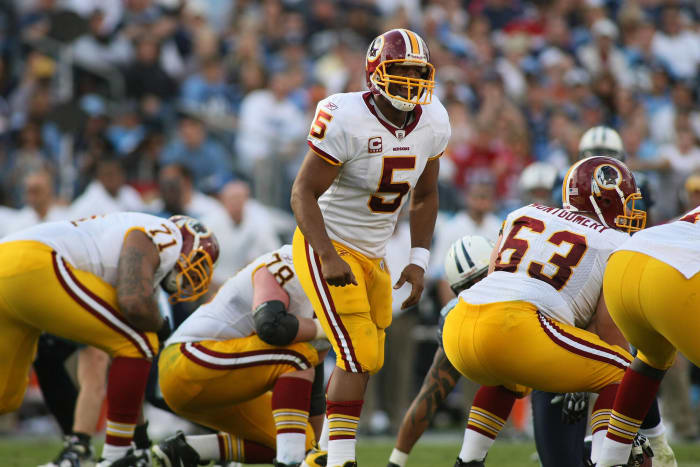
Two memorable trades highlighted this stretch. After bolting on its 2009 starter, former first-round pick Jason Campbell, Washington traded second- and fourth-round picks for Donovan McNabb, whom the Eagles were replacing with Michael Vick. Although the 11-year Eagles starter was coming off a Pro Bowl season, he struggled in 2010. Washington traded the declining standout to Minnesota for two sixth-rounders in 2011; Rex Grossman then piloted an incredibly forgettable 2011 season. Then, the Robert Griffin III trade. Peyton Manning had Washington on his radar, but the RG3 swap with the Rams -- for three firsts and a second -- kyboshed that.
Arizona Cardinals, 2009-13

The Cardinals do spin their wheels at quarterback. Their most recent spree of upgrade efforts came as Kurt Warner retired. Arizona signed Derek Anderson in 2010 and traded a notable haul for Eagles backup Kevin Kolb in 2011 (Dominique Rodgers-Cromartie and a second-round pick). A former second-rounder, Kolb lasted two seasons in Arizona and did not beat out ex-Cards fifth-rounder John Skelton to open 2012. Larry Fitzgerald was still 3-for-3 in Pro Bowls during the post-Warner period, but he flourished in his early 30s with Carson Palmer, whom Arizona acquired from Oakland for just sixth- and seventh-round picks in 2013.
Oakland Raiders, 2011-14

The Raiders parted with far better assets to land Palmer. But Jason Campbell was initially tabbed to pick up the pieces from JaMarcus Russell's brutal stay. After Campbell led the Raiders to an 8-8 season in 2010, his broken collarbone prompted Oakland -- which was without a GM, 10 days after Al Davis' death -- to trade first- and second-round picks for Palmer, ending his quasi-retirement. After a new regime traded Palmer in 2013, the Raiders gave Terrelle Pryor nine starts in a strange transition year. While Pryor still holds the record for longest QB run (93 yards), Derek Carr became the longest-tenured QB1 in Raiders history, lasting nine years.
Minnesota Vikings, 2013-16
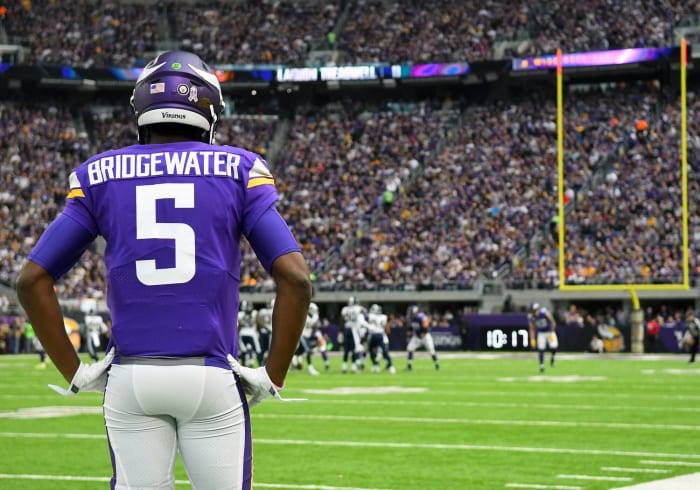
Sam Bradford checks in on this list three times; the former No. 1 pick concludes the Vikings section. As the team soured on 2011 first-rounder Christian Ponder, it reinvested via the 2014 first-round Teddy Bridgewater pick. But the Vikes eased Bridgewater into work by beginning the '14 season with Matt Cassel at the helm. Bridgewater took over soon after and started throughout the '15 campaign. A gruesome, career-stalling knee injury during Minnesota's 2016 training camp led Bridgewater out of the mix. A desperate Vikes team sent the Eagles first- and fourth-round picks for Bradford soon after. This sequence may well have cost Bridgewater millions from an extension that never came.
Philadelphia Eagles, 2013-16

Michael Vick did not hold up as McNabb's successor. Injuries stopped Vick's Philly run in 2013. Nick Foles then led Chip Kelly's first Eagle team to the playoffs, during a season in which he tied the NFL record with a seven-TD pass game, and opened the 2014 season as the Birds' starter. But Kelly obtained personnel power in 2015. Amid a transaction binge, he traded the Andy Reid-era QB investment to the Rams for Sam Bradford. Back in power after Kelly's 2015 firing, GM Howie Roseman acquired a first-round pick for Bradford, who became the Vikings' emergency Teddy Bridgewater replacement. This cleared the onramp for No. 2 overall pick Carson Wentz in 2016.
Houston Texans, 2013-18
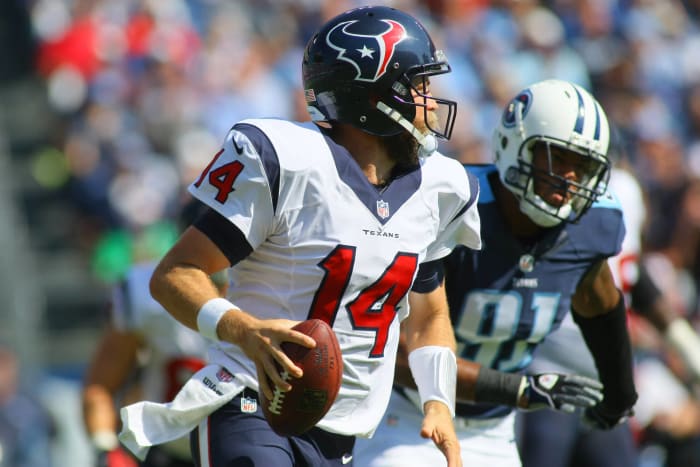
Matt Schaub's 17-year career lasted until 2020, but the Texans' Pro Bowl starter hit a wall in 2013 -- a 2-14 Houston season that ended a six-year Schaub run. The ensuing Bill O'Brien years brought extreme turnover. Ryan Fitzpatrick's fifth NFL stop came via a 2014 free agency agreement. Although Fitz threw multiple TD passes to J.J. Watt, the Texans traded him to the Jets for a sixth-round pick in 2015. Ryan Mallett started in Week 1 of 2015, but Brian Hoyer replaced him and led Houston to the playoffs. The ill-fated Brock Osweiler contract then went down. Houston's NBA-style Osweiler salary dump in 2017 did not lead straight to Deshaun Watson, who sat behind Tom Savage for one half to start that season..
Cleveland Browns, 2013-19
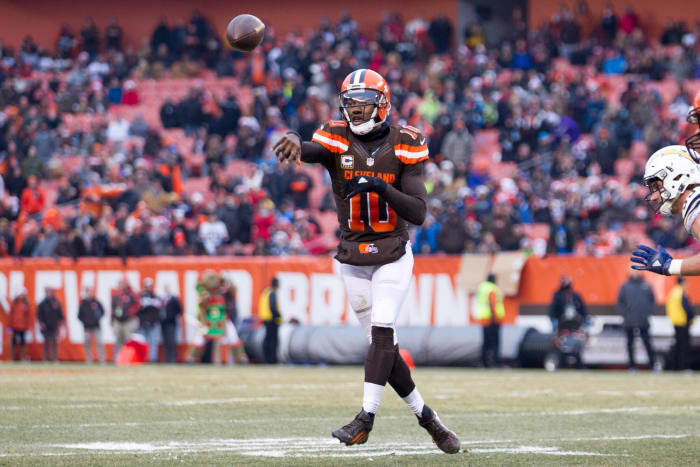
First-round picks Brandon Weeden and Baker Mayfield bookended the NFL's worst modern-era stretch. Weeden did unleash Josh Gordon in 2013, but Cleveland native Hoyer was the Johnny Manziel bridge in 2014. The brash mega-bust never made a Week 1 start, being deemed unqualified by 2015, when the Browns signed Josh McCown. RG3 received the keys in 2016, a 1-15 slate involving three starters and some Kevin Hogan time, while DeShone Kizer was there for nearly the entirety of Cleveland's 0-16 unraveling in 2017. Mayfield replaced trade acquisition Tyrod Taylor, starting a Taylor trend, early in 2018. This was a tour de force quarterback shuffle to start the Haslam era.
St. Louis/Los Angeles Rams 2013-17

Mediocrity ran amok during St. Louis' NFL outro. As the last of a rookie-friendly CBA's No. 1 overall picks, Bradford signed a six-year, $78 million deal in 2010 (a cool $56M more than Cam Newton's 2011 contract). But the Heisman winner tore ACLs in October 2013 and August 2014, halting his run of Week 1 St. Louis starts at four. Shaun Hill initially replaced Bradford, but he and Austin Davis split work in 2014. The Bradford-for-Foles trade did not get the Rams even a season's worth of starts, with Foles being benched. Case Keenum -- on stop No. 2 in his four-time zone journey -- became Jared Goff's bridge to start the second Los Angeles era.
San Francisco 49ers, 2015-18
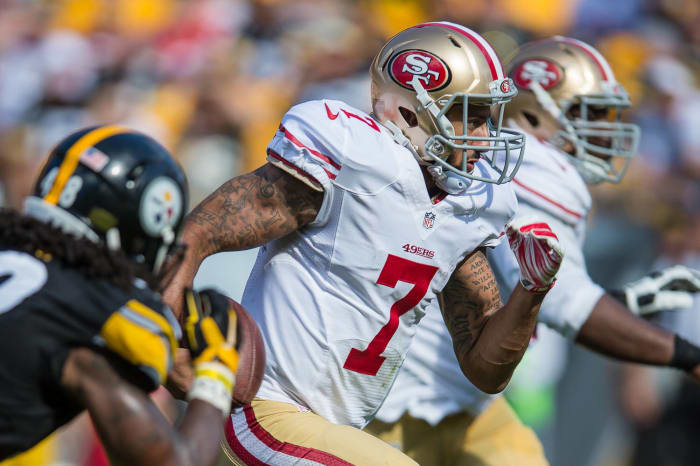
Before Colin Kaepernick's historically controversial ending with the 49ers, the Super Bowl starter was left holding the bag as the franchise deteriorated. Regressing as the 49ers turned the page from Jim Harbaugh to lesser coaches, Kaepernick suffered a shoulder injury in 2015 and did not beat out Blaine Gabbert in 2016. While Chip Kelly reinserted the newly polarizing QB, San Francisco's 2-14 year prompted Jed York to hire a new coach in a third straight offseason. Kyle Shanahan did not spring for a franchise QB to open 2017, leading to an 0-9 start behind Brian Hoyer. This period should make fans more appreciative of the Jimmy Garoppolo years.
Denver Broncos, 2017-2022
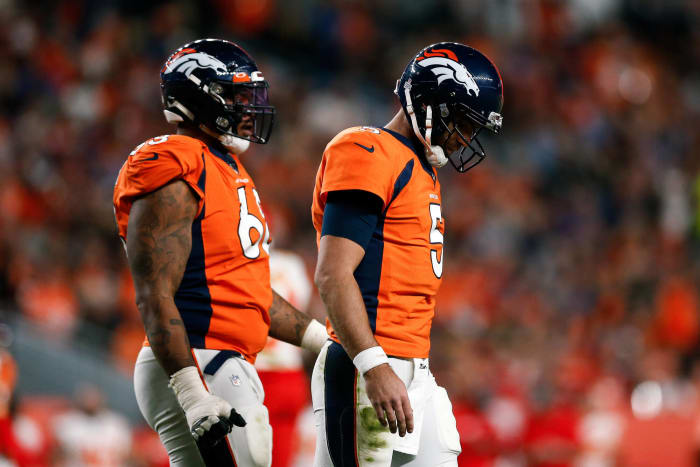
Denver's post-Peyton Manning/pre-Russell Wilson effort is an interesting footnote in quarterback history. The Broncos started 11 QBs (counting Phillip Lindsay's Wildcat snap in 2020's Kendall Hinton game necessitated by COVID-19 protocols) from 2016-21. The Week 1 arms between the stars: Trevor Siemian, Case Keenum, Joe Flacco, Drew Lock, Teddy Bridgewater. Siemian kept the job in 2017, marking a bad sign for Denver's 2016 Paxton Lynch investment. The Broncos tried a first-round pick (Lynch), a second-rounder (Lock), an $18 million-per-year deal (Keenum) and three trades to fix the issue. This doubled as the team's worst stretch since the early 1970s.
Indianapolis Colts, 2017-2023

The Colts have good excuses for their spurt of QB instability; Andrew Luck missed a season due to a shoulder injury and abruptly retired because of a different injury two years later. Indianapolis started Scott Tolzien in Week 1 of the 2017 season, and Luck's 2018 Comeback Player of the Year nod injects a sobering "what if?" into the modern Colts equation. After Jacoby Brissett's 30 starts, Indy capitalized on the 2020s' QB markets by landing Philip Rivers, Carson Wentz, and Matt Ryan. But each became a one-and-done. The Colts attempted to stop this carousel by drafting Anthony Richardson fourth overall in 2023. While Gardner Minshew has played much of this season, Richardson's rehab points to him stopping this Colts streak at seven.
Washington, 2017-2023
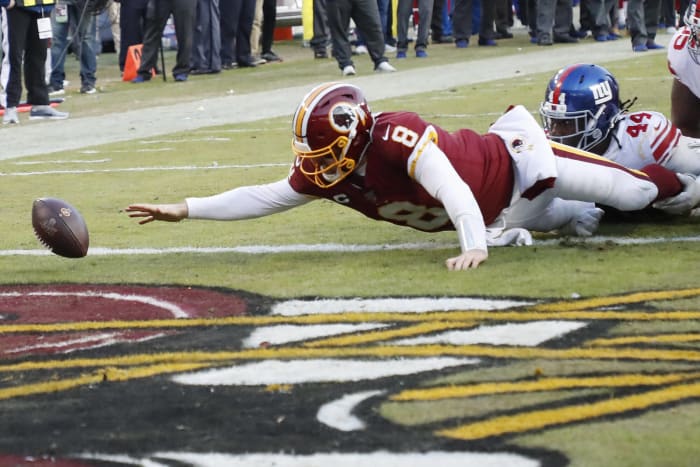
Washington's woes form a canal connecting this period's two other beacons of QB acquisitions. The Broncos traded Keenum to Washington in 2019; the Colts sent Carson Wentz to #TakeCommand of a situation marred by mismanagement and bad luck. Bruce Allen and Dan Snyder botched the Kirk Cousins saga, and Dwayne Haskins did not pan out. But Alex Smith had the 2018 team atop the NFC East at the time of his eerily Theismann-esque injury. Smith's stunning return rescued Washington in 2020, but he retired in 2021. And free agency pickup Ryan Fitzpatrick lasted all of 16 plays. Taylor Heinicke did not factor into a Week 1 equation; both he and Wentz were elsewhere by 2023. Signs point to '23 starter Sam Howell stopping this streak next year. Will he remain the starter post-Ron Rivera?
Carolina Panthers, 2019-2023

Cause for concern emerged for the Panthers -- set at QB for most of the 2010s -- after Cam Newton injuries piled up. A Lisfranc issue ended Newton's first Panthers stint two games into the 2019 slate. Matt Rhule cut the former MVP and kept trying veteran fixes. A three-year, $63 million Teddy Bridgewater deal led to a one-year fix; Rhule traded three picks for Sam Darnold in 2021. Months of 2022 trade talks led Baker Mayfield to Charlotte; that fit proved poor. Post-Rhule, the Panthers -- who aggressively pursued Deshaun Watson in 2021 and '22 -- made a blockbuster trade to close this revolving door. That now comes with scrutiny, with owner David Tepper driving the bus for Bryce Young (over the rumored objections of since-fired HC Frank Reich).
Houston Texans, 2020-23
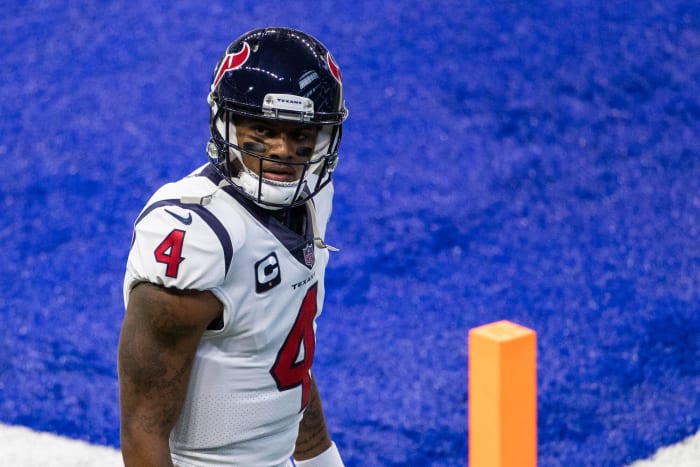
Deshaun Watson stopped the Texans' previous carousel, and the Pro Bowler signed a four-year, $156 million extension in September 2020. Five months later, Watson-driven turmoil engulfed the franchise. The NFL's passing yards leader in 2020, Watson requested a trade in January 2021. Soon after, a career-altering avalanche of sexual misconduct and/or sexual assault allegations surfaced. The Texans deactivated Watson throughout 2021, beginning the year with Tyrod Taylor at the helm. Davis Mills took over late that season and opened 2022 as Houston's starter. The Texans, who traded Watson in a 2022 blockbuster, won 11 games from 2020-22. The team looks to have filled its need with No. 2 overall pick C.J. Stroud, who took the reins in 2023.
New York Jets, 2020-23

Sam Darnold's third season at the controls produced a 2-14 record, opening the door to what became a disastrous decision. COVID-season rising prospect Zach Wilson enticed Jets management to trade Darnold to the Panthers and select the BYU product second overall. Wilson had feasted on mostly low-level competition in 2020, and he has become an all-time NFL bust. A Wilson shoulder injury brought in Joe Flacco to open the 2022 season, and the Jets went all out to stop this run of failed prospects by trading for another Hall of Fame-bound Packer. Fifteen years after Brett Favre, Aaron Rodgers arrived in New York via trade. Rodgers' first Jets season featured four plays, with an Achilles tear ruining Gang Green's 2023 plan.
Sam Robinson is a sportswriter from Kansas City, Missouri. He primarily covers the NFL for Yardbarker. Moving from wildly injury-prone sprinter in the aughts to reporter in the 2010s, Sam set up camp in three time zones covering everything from high school water polo to Division II national championship games
More must-reads:
- The best quarterback divisions in NFL history
- The greatest NFL QBs to hail from smaller college programs
- The 'NFL undrafted receiving leaders' quiz
Breaking News
Trending News
Customize Your Newsletter
 +
+
Get the latest news and rumors, customized to your favorite sports and teams. Emailed daily. Always free!
PRIVACY POLICY EDITORIAL POLICY CONTACT US
ABOUT YARDBARKER TERMS OF SERVICE
Use of this website (including any and all parts and
components) constitutes your acceptance of these
Terms of Service and Privacy Policy.
This site is for entertainment purposes only.
There is no gambling offered on this site.
Gambling Problem? Call 1-800-Gambler.
